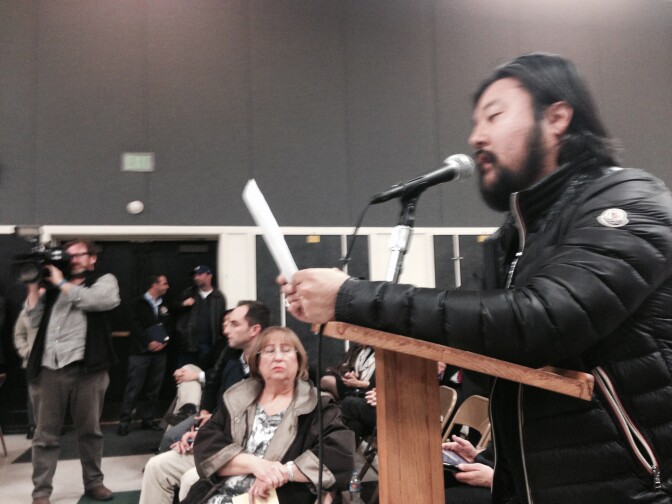This story is free to read because readers choose to support LAist. If you find value in independent local reporting, make a donation to power our newsroom today.
This archival content was originally written for and published on KPCC.org. Keep in mind that links and images may no longer work — and references may be outdated.
State lacks backup plan if natural gas dwindles due to Porter Ranch leak

A top utilities regulator said Thursday that both the state and Southern California Gas Co. lacked contingency plans to deal with the loss of natural gas supplies from an underground storage facility near Porter Ranch that is the site of an ongoing natural gas leak.
California Public Utilities Commission director Elizaveta Malashenko acknowledged there was no quick substitute for the gas that millions of Southern Californians rely on during a meeting of the state Assembly Utilities and Commerce Committee at Granada Hills Charter High School.
Assemblyman Mike Gatto (D-Los Angeles), who chairs the committee, chose the community near the stricken facility as the site for the first state legislative hearing concerning the natural gas leak, which began Oct. 23.
Malashenko said the state has backup plans for electrical utilities to replace power supplies when plants are shut down but does not have similar plans for gas facilities.
"There are more solutions on the electrical side and not on the gas side." Malashenko said.
The Aliso Canyon Natural Gas Storage Facility is the largest underground storage field west of the Mississippi River. It is dotted with oil wells drilled in the 1950s. When the oil supply was depleted, the field was converted in the 1970s to store natural gas, and 115 oil wells were converted to inject natural gas into the underground reservoir.
Under a state order, SoCal Gas has been withdrawing gas from other wells to reduce the pressure on the leaking well. Further injections of natural gas imported from other locations are barred at least until the ruptured well is plugged, and many have called for the injections to stop altogether until extensive inspections and safety measures are taken.
SoCal Gas has said it will take until late February at the earliest to stop the gas leak -- a period when cooler winter temperatures are likely to boost demand for gas to heat homes.
In addition, delays or outright prohibitions against restocking the storage facility could undercut the ability of electrical providers who rely on gas to provide power during the hot summer months when demand for air conditioning peaks.
Rep. Brad Sherman (D-Sherman Oaks) also addressed the panel, calling the Porter Ranch leak the largest in U.S. history. He blamed lax federal and state laws for permitting homes to be located so close to gas storage facilities.
Sherman, who moved to Porter Ranch a year ago, toured Southern California Gas Company's Aliso Canyon Natural Gas Storage Facility Tuesday. He said it was too foggy that day to see the leaking well, but said he could hear the leaking gas from a half-mile away.
Sherman said the gas field, which is under a state order to stop injecting gas into the underground reservoir until the leak is plugged, should not receive more gas injections until modern safety equipment is installed on the field's 115 gas wells. Many of the wells are 50 years and older.
He called for state legislation that would speed resolution of court cases brought by homeowners who sue SoCal Gas for lost home values.
The panel was one of the few public venues where residents have been able to directly question state officials and a representative of SoCal Gas. Those were the most tense exchanges.
Porter Ranch homeowner Kelly Hill lashed out at SoCal Gas Vice President Jimmie Cho about her inability to stay in her home since Nov. 22 because of the gas leak.
"I want you, Mr. Cho, to buy my house for $850,000" Hill said.
Another resident asked about the history of fracking near the leaking well. Hydraulic fracking, the practice of injecting fluids at high pressure into underground rock formations to force oil and gas into wells, has been performed at the Aliso Canyon site, but not close to the ruptured well, a state official said.
Jason Marshall, chief deputy director of the California Department of Conservation, said his staff searched records of oil wells near the leaking well and concluded fracking was not a likely cause of the leak.
"None of the wells within 1,500 feet were subject of hydraulic fracking," Marshall said.








